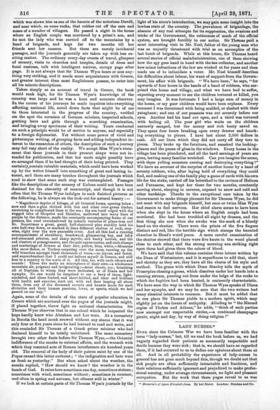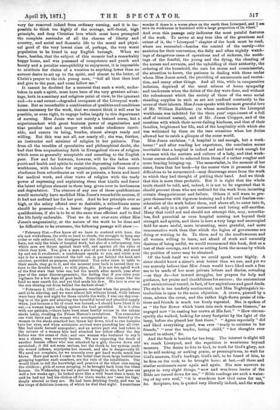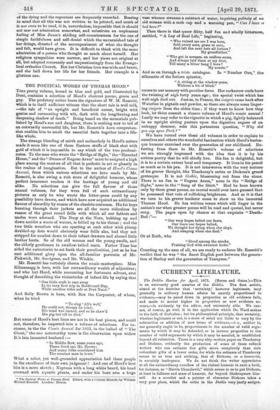LADY NURSES.* EVER since the Crimean War we have been
familiar with the term "lady-nurses," but, till we read the book before us, we had vaguely regarded their patients as necessarily respectable and docile because they were sick ; that is, we should have so regarded them, if it had occurred to us to define our opinions about them at all. And in all probability the experience of lady-nurses in general has not gone much beyond this, though we doubt not that sick people are often sufficiently intractable and fractious, and their relations sufficiently ignorant and prejudiced to make profes- sional nursing, under average circumstances, no light and pleasant occupation. But the work that these pages reveal to us was
* Memorials of Agues Elisabeth Jones. By her Sister. London : Strahan and Co.
very far removed indeed from ordinary nursing, and it is im- possible to think too highly of the courage, self-denial, high principle, and deep Christian love which must have prompted the complete surrender of all the charms of liberty and country, and social and dc,inestic life to the moral and physi- cal good of the very lowest class of, perhaps, the very worst population to be found in any English borough. When we learn, besides, that the subject of this memoir had a remarkably happy home, and was possessed of competence and youth and beauty and a peculiar susceptibility to enjoyment, it is impossible to attribute her choice of a vocation to anything lower than an earnest desire to act up to the spirit, and almost to the letter, of Christ's prayer to the rich young man, "Sell all that thou hest and give to the poor, and come follow me."
It cannot be doubted for a moment that such a work, under- taken in such a spirit, must have been of the very greatest advan- tage, both in a sanitary and religious point of view, to the ignorant and—to a sad extent—degraded occupants of the Liverpool work- house. But so remarkable a combination of qualities and conditions seems necessary for the work, that we cannot think it will ever be possible, or even right, to engage ladies largely in this department of nursing. Miss Jones was not merely a trained nurse, but a superintendent with great business power of organization and that peculiar tact and temper which make obedience inevit- able, and ensure its being, besides, almost always ready and willing. But this was not all, nor nearly all; she was, further, an instructor and minister of religion to her patients. Free from all the troubles of speculative and philosophical doubt, she had that firm unquestioning faith in Evangelical views of religion which seem so generally acceptable and consoling to the English poor. Few and far between, however, will be the ladies with youth and health and spirits to resist the depressing influences of a workhouse, with talents for organization, qualities that ensure obedience from subordinates as well as patients, a brain and hand for medical work, and clear views of religion with the ready power of expressing and explaining them that kindle and foster the latent religious element in those long given over to lawlessness and degradation. The absence of any one of these qualifications would materially have modified Miss Jones's remarkable success, if it had not unfitted her for her post. And be her principle ever so high, or the salary offered ever so desirable, a subordinate nurse should be possessed—in a lesser degree perhaps—of the same qualifications, if she is to be at the same time efficient and to find the life fairly endurable. That we do not over-rate either Miss Jones's magnanimity, or the nature of the work to be done and he difficulties to be overcome, the following passage will show :—
0 February 21st.—Few know all we have to contend with here, the sin and wickedness, the evils so hard to check, the struggle to keep any order or rule enforced, the drudgery and the thanklessness. We have here, not only the trials of hospital work, but also of a reformatory, into which men are thrust against their will, and against all the rules of /which they kick. You give a man a pint of porter to drink, and stand by and see it swallowed ; a confederate speaks to you, and while your oye is for a moment removed the full can is put behind the back and another, provided on purpose, substituted. You order them to table to their meals, they go to it, and the moment your back is turned they re- turn to the fireside bench; so with pipes, &c. It is not the uphill work -of the first start that tries one, but the month after month, year after year of the same disconragements ; the feeling that if you relax your vigilance for a few days all goes back. Sometimes this seems like the Sand no man careth for, and yet God sends his dew. His love is over as the sun shining out from behind the darkest cloud."
"February 4, 1867.—In the desperate weather when the people were said to be starving, and we were almost left without bread, while bakers were busy day and night for those outside the walls, I was one day corn- ing in at the gate and admiring the beautiful broad and plentiful supply when, just because a bit of crust was burned,—I should have liked it to eat,—a woman began railing against the food provided. So is it often with our patients,—there have been some fearful scenes in the oakum sheds lately, rivalling the Prison Matron's revelations. You remember our visit there and the woman who accompanied us. On Saturd '37 the women in the sheds attacked her, threw her down, tried to run hairpins Into her eyes, and when assistance arrived were pounding her all over. She had made herself unpopular; and an active part she had taken in the seizure of a woman who had attacked her fellow-officer the day before was the cause of this ; and one woman who ventured to say it was a shame, was severely beaten. We are expecting the death of another female officer who was attacked by a girl, thrown down and scratched ; it did not seem serious, but the shock to her system made the wound inflame, erysipelas has ensued, and she is dangerously ill. We need not complain, for we scarcely ever get hard words, much less blows. More and more I come to the belief that these large institutions grouping together such numbers, are the ruin of the inhabitants. One would blush to tell the knowledge and practice of the vilest sins among the children ; girls of seven escaping, to be brought back from the vilest houses. On Wednesday we had a patient brought in who had gone out well a few weeks ago ; he looked more like a wild beast than a man, he said he had not had his clothes off for three weeks, nor 'seen his legs,' deeply ulcered as they are. He had been drinking freely, and was on the verge of delirium tremens, of which he died that night. I sometimes wonder if there is a worse place on the earth than Liverpool, and I am sure its workhouse is burdened with a large proportion of its vilest." And even this passage only indicates the most painful features of the work. To arrive at any true idea of the greatness and extent of it, the " Liverpool " chapter of the book must be read, where are recounted—besides the control of the unruly—the anxieties for their conversion, the daily and often nightly watch- ing,s of dangerous cases of operations and of sickness, the Booth- bugs of the fearful, the young and the dying, the cheering of the nurses and servants, and the upholding of their authority, the ordering of the household, the care for stores and commissariat, the attention to hours, the patience in dealing with those under whom Miss Jones acted, the providing of amusements and recrea- tion, and many other things. And all this, while in comparative isolation, deprived of the usual solaces of home sympathy and tenderness when the duties of the day were done, and without the refreshment which the society of those of the same social standing supplies to such as are not confined constantly to the scene of their labours. Mies Jones speaks with the most grateful love of Mr. William Rathbone (to whose munificence the Liverpool workhouse was indebted for the three year' expe,iment of a full staff of trained nurses), and of Mr. James Cropper, and of the sunshine with which their never-failing kindness, and that of their families, brightened her life, and of the hospitality with which she was welcomed by them on the rare occasions when her duties allowed her to catch a glimpse of the outer world.
Miss Jones exclaims, "A hospital is sad enough, but a work- house !" and after reading her experience, the conclusion seems inevitable that a hospital is indeed sad and hard work enough for a woman with the nurture and culture of a lady, and that work- house nurses should be selected from those of a rather rougher and more bracing bringing-up. The memorialist, in the memoir of her sister, fears that her book—by the nearer view it presents of the difficulties to be surmounted—may discourage some from the work to which they had thought of putting their hand. And we think that this is more than probable. But it is right that the whole truth should be told, and, indeed, it is not to be regretted that it should prevent those who are unfitted for the work from incurring certain disappointment and failure. Others it will warn to pre- pare themselves with vigorous training and a full and fearless con- sideration of the work before them, and above all, to enter into it, if at all, only in a spirit of unreserved and loving self-sacrifice. Many that could not and should not attempt this, may, neverthe- less, find parochial or even hospital nursing not beyond their strength and spirits, and there is here a very large and unoccupied field for more useful, more interesting, more grateful, and more remunerative work than that which the legion of governesses are doing or wishing to do. To them and to the needlewomen and all women willing to learn, not afraid of work and earnestly desirous of being useful, we would recommend this book, first as a test of their courage, and next as setting forth the means by which the position of nurse may be obtained.
Of the book itself we wish we could speak more highly. A sister should know a sister's wish better than we can, and yet we can scarcely believe that Miss .I ones would have liked such a free use to be made of her most private letters and diaries, revealing —as they do—her inward struggles, her prayers for help and guidance, her praise and thankfulness for success ; the unconscious and unintentional record, in fact, of her aspirations and good deeds. The style is too tenderly sentimental, and Miss Nightingale's in- troduction is open to the same objection. A crown, pierced by a cross, adorns the cover, and the rather high-flown praise of rela- tions and friends is much too freely repeated. She is spoken of as "the fair flower which burst into such wondrous blossom," as engaged now "in casting her crown at His feet." "how circum- spectly she walked, looking for every footprint by the light of the lamp, before she placed her foot there." "Agnes especially " did and liked everything good, was ever "ready to minister to her friends," " ever the tender, loving child," "her thoughts ever turned to others." &c.
And the book is besides far too long. The interest is slight till we reach Liverpool, and the repetition is wearisome beyond measure. The desire to live to God, to work for God's glory, not to be self-seeking, or seeking praise, or presumptuous, to wait for God's answers, God's leadings, God's call, to be found of him, to be firm on the rock, to be brought hom3 at last,—all these and similar sentiments recur again and again. She sees answers to prayer in very slight things, "new and wondrous leaves of the Bible are turned down for me," "Bible readings are such a water- ing of my own soul," "it is wondrous how God cares for me," &c. Scripture, too, is quoted very liberally indeed, and the words of the dying and the repentant are frequently recorded. Bearing in mind that all this was not written to be printed, and much of it not even to be read, it is, nevertheless, impossible that it should not mar our admiration somewhat, and substitute an unpleasant feeling of Miss Jones's abiding self-consciousness for the one of simple faithfulness and self-denial which the unvarnished tale of her doings, divestel of the accompaniment of what she thought and felt, would have given. It is difficult to think with the same admiration of a person who thought so much about herself. Her religious sympathies were narrow, and her yiews not original at all, but adopted reverently and unquestioningly from the Evange- lical orthodox Church. But her Christian love was wide and brave, and she laid down her life for her friends. Her example is a glorious one.




































 Previous page
Previous page